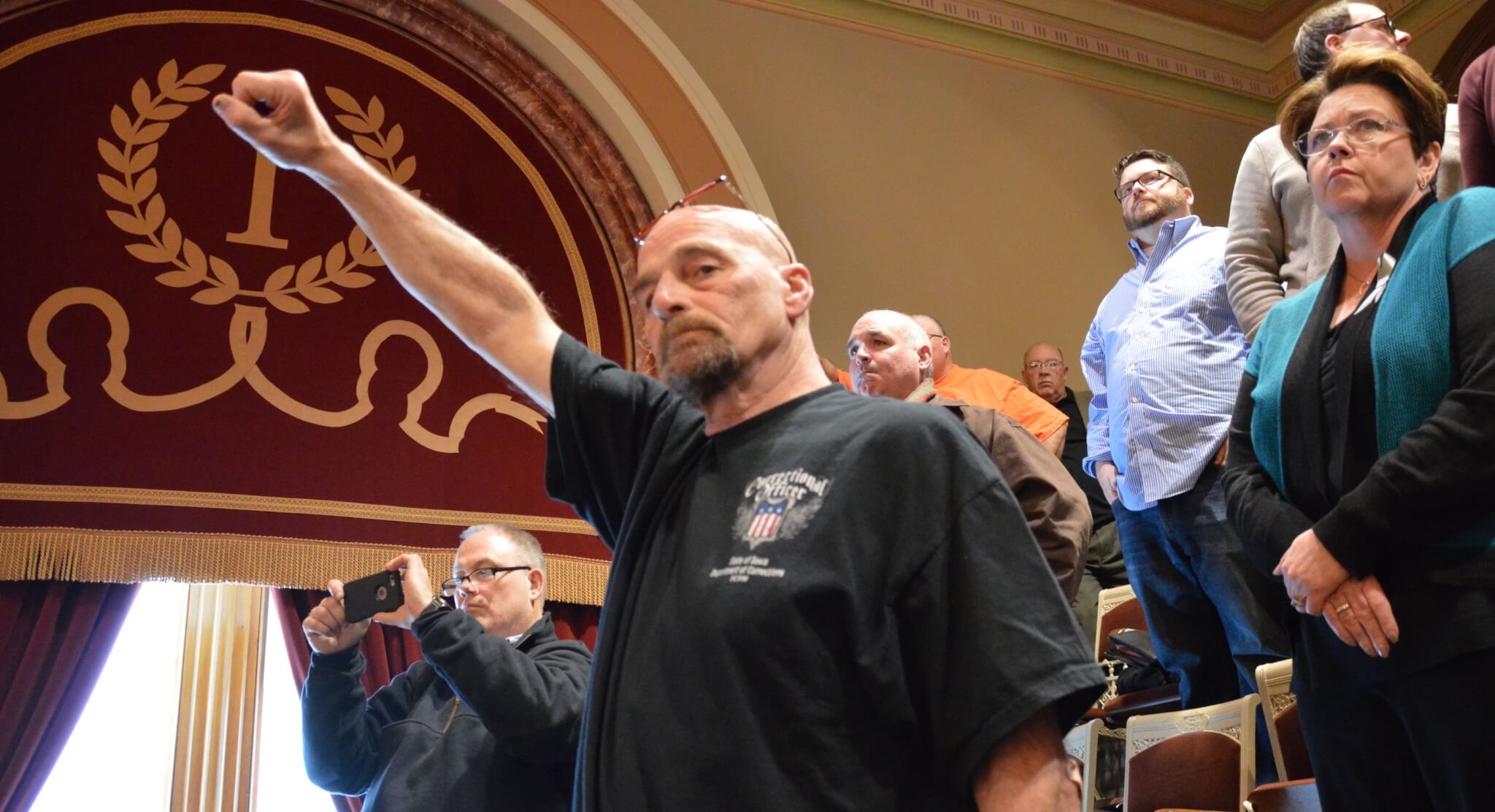
Iowa public employee unions voted overwhelmingly in favor to maintain their existence this week, despite Iowa Republican politicians’ best efforts to destroy them. Earlier this year, legislative Republicans and then-Governor Terry Branstad passed a wide-ranging collective bargaining bill that limited what Iowa public workers could bargain for. It also instituted re-certification votes with extremely cumbersome rules – local bargaining units needed a majority of all their members to vote in favor, not simply a majority of those voting.
Iowa’s unions pointed out that if the same standards were applied to Iowa’s elected officials, no one would win election. By not voting, you were essentially casting a “no” vote. But so it went, and unlike most pieces of legislation that implement major policy changes over time, Republicans mandated that these new rules take place within just months.
But Iowa’s public unions proved more resilient than Republicans had hoped. 436 of 468 local unions voted to re-certify, most by overwhelming numbers. 33,252 public employees were covered by the local unions up in this election. 28,448 voted in favor of certification, compared to only 624 people who voted against. That amounts to 86% of public employees voting in favor, and only 2% voting against. 4,043 people did not vote, or about 12% of the total eligible. 137, or half a percent, tried to cast a vote, but it was considered “void.”
The voting process itself was made as difficult as possible, and Iowa’s union leaders complained of needless obstacles in the phone and online voting process. Still, 86% voted in favor of re-certification.
A mix of unions represented the individual bargaining units involved. AFSCME and ISEA comprised the lion’s share, representing most of the county workers and local school district employees. But the Teamsters, SEIU, Operating Engineers (IUOE), Communications Workers (CWA), LiUNA, Machinists (IAMAW) and Painters (PPME), among a few others, comprised a patchwork network of the rest. The Teamsters represent many police officers and dispatchers, SEIU covers healthcare workers and PPME covers a number of road and public works employees. You can see all the results at this link.
Most of the locals re-certified with convincing turnouts and near-unified support. 141 of the 144 employees in the Keokuk Community School District voted to re-certify. 256 of the 265 members of the Des Moines Police bargaining unit voted in favor. 409 of the 433 members of Cedar Falls’ education association voted to retain their union. 34 of 34 Clinton firefighters cast ballots for re-certification.
Still, 32 of 468 unions failed to re-certify, or about 7% of the total unions up this week. However, many of those locals were relatively small. By Starting Line’s count (it’s possible I missed one), the unions that de-certified had a combined total of 1,004 people. All the unions up in this week’s election represented 33,252 public employees. So, while 7% of the locals de-certified, they only accounted for 3% of public workers involved. Obviously, Iowa’s unions would have preferred that to be 0%, but it’s still a major accomplishment given the circumstances.
The Teamsters lost the most local unions, seeing 13 locals fail to re-certify, including the Boone County Jail, the Dallas County Courthouse workers and the Pella Public Works. Cherokee County workers in Northwest Iowa, represented by the Operating Engineers, did not seem too keen on union representation. The roads, sheriff and board of health groups all failed to re-certify, totaling 42 employees in all. Zero people voted in the roads and sheriff units. The Cherokee County school association, however, cast 79 of 80 potential votes in favor of staying organized.
The biggest loss came with SEIU’s unit at Broadlawns, where a 197-person unit failed to re-certify. Those who voted cast ballots 3-to-1 in favor of re-certification (74 to 27), but it didn’t meet the 50%+1 threshold of total members. The Sergeant Bluffs-Lutton schools mixed unit, represented by Teamsters 554, which represents 113 people, failed to re-certify with only 40 of the needed 57 votes (the separate Sergeant Bluffs-Lutton Education Association passed theirs with 113 of 113 members voting in favor – as I hinted, some of this is confusing).
The other decent-sized locals that didn’t re-certify were the Center Point Urbana Education Association (90 employees represented by the Teamsters), the Centerville community school district’s mixed unit (72 people represented by the Teamsters – it failed by a single vote) and the Iowa Falls school district’s mixed unit (64 people represented by the Teamsters). Both of ISEA’s units in Sigourney (Keokuk County), representing 74 people in all, didn’t re-certify. Sadly, the West Des Moines Library Board (I go to my local library often) failed re-certification by one vote.
And the one-person member local of Webster City’s Operating Engineers “blue collar” unit failed to re-certify. You know who you are.
Even with the handful of losses, given the difficulties placed on the public employees’ elections, it’s hard to see the results as anything other than a sweeping victory. With the number of units, people and dynamics involved, some were certain to come up short. But overall, public employees resisted the GOP’s efforts to extinguish them.
Republicans already got their victory on future wages and benefit costs by vastly restricting what public unions could bargain for. But did their attempt to also outright eliminate local unions backfire on them?
Yes, Iowa’s public unions had to spend a considerable amount of time and resources mobilizing all their members to ensure they voted in this week’s election. That took up a lot of bandwidth from both their union reps and political staff. However, it also provided unions with the perfect excuse to reengage with their members on a crucial topic, and let them cast Republicans as trying to eliminate their very existence.
And considering Republicans’ voting law changes next year will make it more difficult to vote in Iowa, public union members just showed they could overcome the most arduous of obstacles. Public employees obviously skew Democratic, but they don’t all vote in lock-step. This ordeal certainly only made many independent and Republican labor members question their allegiances and focus their anger on Reynolds and Republican lawmakers. That could prove particularly problematic for the GOP ticket in 2018.
by Pat Rynard
Posted 10/25/17
Politics

Biden marks Earth Day by announcing $7 billion in solar grants
The Biden administration on Monday announced the recipients of its Solar For All Program, a $7 billion climate program that aims to lower energy...

6 terrifying things that could happen if the Comstock Act is used to target abortion
Does 1873 sound like a really, really long time ago? Well, that’s because it is—but if Republicans and far-right anti-abortion activists have their...
Local News

No more Kum & Go? New owner Maverik of Utah retiring famous brand
Will Kum & Go have come and gone by next year? One new report claims that's the plan by the store's new owners. The Iowa-based convenience store...

Here’s a recap of the biggest headlines Iowa celebs made In 2023
For these famous Iowans, 2023 was a year of controversy, career highlights, and full-circle moments. Here’s how 2023 went for the following Iowans:...





